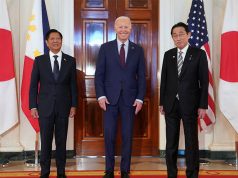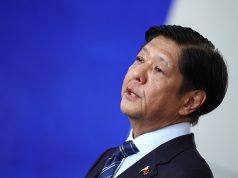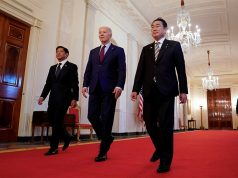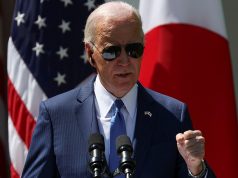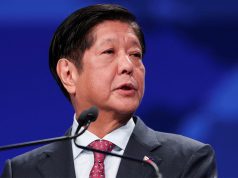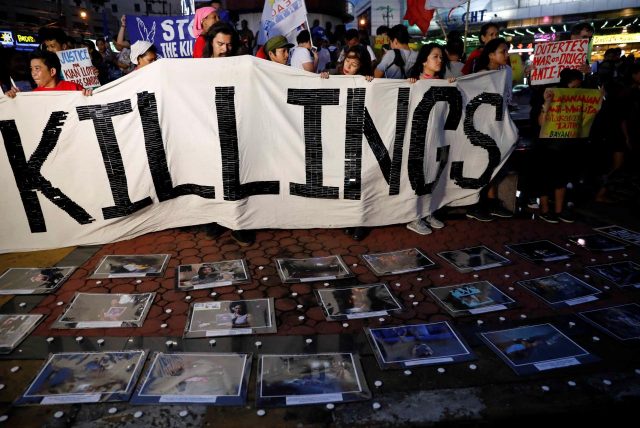
MANILA, Philippines — (UPDATE – 2:16 p.m.) After dismissing recommendations on ending extrajudicial killings, not just the thousands associated with the war on drugs but also those protecting journalists and human rights defenders, the government claimed a “big victory” in the review of its record by the United Nations Human Rights Council.
“The Philippines scored a big victory in Geneva today (September 22) when the United Nations Human Rights Council overwhelmingly adopted Manila’s human rights report card,” a statement posted on the Department of Foreign Affairs website on Saturday boasted.
It then quoted Foreign Affairs Secretary Alan Peter Cayetano, who is in New York to attend the 72nd session of the UN General Assembly, as saying: “The final adoption of our UPR Report during the 36th Regular Session of the Human Rights Council in Geneva demonstrates that the Philippines has nothing to hide with its human rights record.”
“The Philippines will remain resolute in its respect for and protection of human rights as it strives to improve the lives and welfare of each and every Filipino by protecting them from the scourges of drugs and criminality,” he added.
The statement then quoted the Philippine Mission to the United Nations in Geneva as saying the report was “warmly welcomed” by Association of Southeast Asian Nations members Laos, Malaysia, Singapore, Myanmar and Thailand, “which all commended the country’s human rights achievements.”
Ambassador Evan Garcia, Philippine Permanent Representative to the United Nations in Geneva, credited “the wise leadership of Secretary Cayetano in showing our human rights commitments and achievements to the world.”
The Philippines fully accepted only 103 — those pertaining to “the sustainable protection of family and society in general, such as the preservation of the sanctity of family life, effective advocacy of economic and social rights through development, mitigation of the adverse effects of climate change, eradication of poverty, and improvements to access to health care and public education” — of the 257 recommendations it received.
Those it rejected were described as “sweeping, vague and even contradictory, especially in the context of the Philippines’ democratic processes,” and included calls for through probes of extrajudicial killings, against restoring capital punishment and lowering the age of criminal liability, and to allow UN special rapporteur Agnes Callamard to visit the country to probe the killings.
As it did when Cayetano, then a senator, presented the country report in May, the Philippines continued to deny extrajudicial killings, saying these were “deaths arising from legitimate law enforcement operations or deaths that require further investigation following the established rules of engagement by the country’s law enforcers.”
But the delegations of the United States and United Kingdom expressed concern over the continued killings.
The U.S. welcomed the government’s acceptance of its recommendations on “conducting police operations consistent with the rule of law and international human rights obligations” but said “we remain greatly concerned about ongoing reports of extrajudicial killings.”
“We urge the government to conduct thorough and transparent investigations into all reports of extrajudicial killings, and to ensure that all investigative and enforcement efforts are conducted in a manner that respect and ensure human rights for all and uphold the rule of law,” it said.
The U.K., for its part, said” “We remain concerned about the high death toll associated with the campaign against illegal drugs and statements questioning the universality of human rights” and urged the government to “ensure thorough and independent investigations into all violent deaths and to commit to bring to justice those involved, including security forces.”
Aside from this, it said: “We are also concerned by continuing threats made against human rights defenders. We call on the Government of the Philippines to promote a safe, enabling environment for the work of human rights defenders, including through the adoption of a charter for the protection and recognition of human rights defenders.”
The human rights group Karapatan quickly called the government’s claim of victory a “farce” for not mentioning that “it did not accept any of the 44 recommendations related to extrajudicial killings, none of the 23 recommendations calling for the government to discontinue efforts to revive death penalty, and none of the 13 recommendations aimed at the protecting and creating an enabling environment for human rights defenders and journalists.”
Karapatan secretary general Cristina Palabay called Garcia’s “dismissive statements” of interventions by civil society groups and denials of impunity “a farcical display of fraudulence, overbearance, and outright misrepresentation of the situation.”
“The Duterte regime and its representatives are shameless in using such a platform to promote distorted facts,” she said.
“There is very little to recognize in the Duterte regime’s human rights record, save for the increasing political repression, state fascism, and impunity among state forces,” Palabay contended.
Earlier, Human Rights Watch, said it was “dismayed that the Philippines rejected all UPR recommendations that would make a practical difference in ending extrajudicial killings perpetrated in the name of its murderous ‘war on drugs’.”
“We are deeply concerned that rather than investigating compelling evidence of culpability of police and their agents in many of those killings, Duterte has launched a campaign of vilification and harassment against individuals and institutions pursuing accountability for those abuses, Senator Leila de Lima, who faces politically motivated drug charges designed to silence her, the official Commission on Human Rights, as well as the Special Rapporteur on extrajudicial executions,” it added, noting that “in its UPR responses, the Philippines even refused to accept recommendations to protect journalists and human rights defenders, or reject incitement to violence.”
It also called on the UNHRC to “step in, and do all that it can to end the violence, support a United Nations-supervised investigations into the deaths, and demand accountability for all unlawful killings” if the government refuses to abide by its obligations to international laws.




